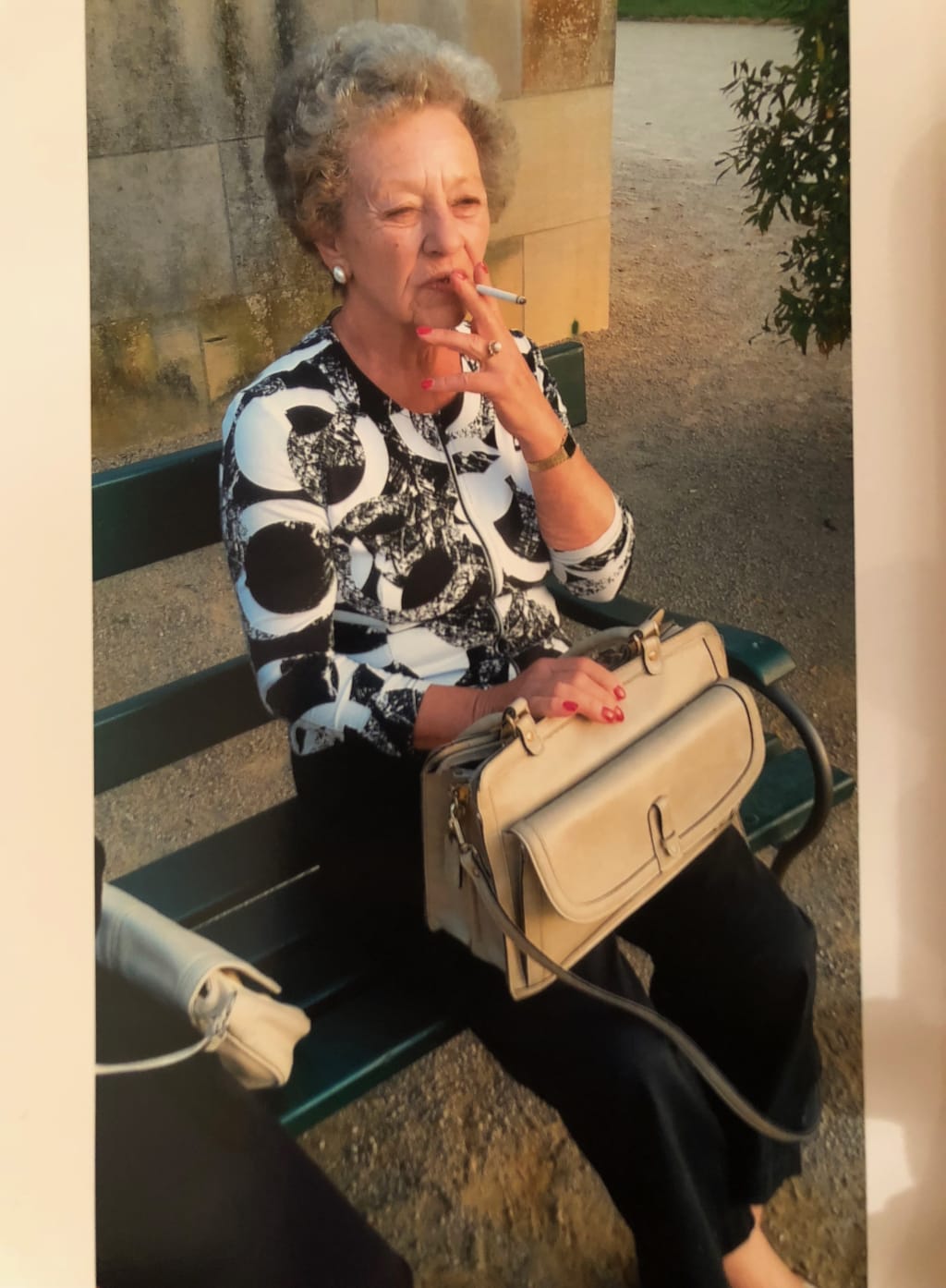Lessons From My Terminal Grandmother
The fragile state surrounding looming death brings wisdom and love.

The Big C
In the Fall of 2018, my father received a call from his Aunt Elizabeth who had grave news. My Omi (which means grandmother in German), was diagnosed with stage four lung cancer that had spread to her liver. She would need chemotherapy, drives to and from doctor’s appointments, and help around the house. Considering the estranged relationship between my father and his mother and my daytime availability since I was in school at the time, I felt it was my duty to step in. Selfishly, it was also an opportunity to not live at home anymore – as if subbing out one adult’s abode for another meant I was more independent.
I pulled up with an extra-large suitcase and a one-way ticket. I’d stay however long it took to make sure Omi was okay during her rounds of treatment. That was the closest I’d ever been to cancer, and the uncertainty around lifespan and stage four cancer gave time new meaning. I’d drive her to and from the hospital, make meals and clean up. We shared more stories and loving words in this time than I can recall in my childhood of knowing her. After about a month and a half, I was asked to leave (in so many words). My late arrivals after a night out kept Omi up worrying, and my belongings that lay outside of my room were creating tension that was palpable. Omi took Christmas Eve as an opportunity to suggest that I go home for the holidays to enjoy time with my family, which was followed by her famous line: “and then we’ll take it from there.”
I went home a little dejected at being kicked out but knowing Omi’s preference for cleanliness and peace of mind, I understood her decision.
Three Months
Over the next year, Omi handled cancer like a champ. She was fiercely independent but also did not entirely comprehend her terminal prognosis, which made her quite resilient to the disease. Then, in November 2019, she had suffered congestive heart failure and was rushed to the hospital. I was living in Florida at the time and found out through my mother a couple of weeks later that she had been hospitalized, she had contracted pneumonia, my father moved in with her, and that her oncologist had anticipated she had three months left to live.
After I flew home mid-December, I once again loaded up my extra-large suitcase and moved into the spare bedroom. As a very independent and private woman, Omi did not want to have a live-in nurse taking care of her. Since I could work from home, I would stay with her during the day and keep her company while my father was at work. He would return at night and we would all eat together and chat a bit before bed.
About two days after I arrived, her condition took a turn for the worse. She went from independence, to requiring help with dressing, feeding, bathing and walking. Does your body hold on until it knows it can stop? I believe the mind anticipates when there is a soft landing or a helping hand or an end to the pain and once that point is met, the body can rest. I relate it to doing a timed plank. My legs, arms, and abs will shake and at precisely the time I plan to stop, my body no longer wants to hold on. Realistically it could, but my brain has told it that it’s okay to stop. There’s an incredible resilience and discipline at that breaking point, but after 81 years of cleaning, cooking, working, and the triple threat of illnesses that had taken hold of her body, Omi desperately needed to slow down.
I slept in Omi’s bed on the third night while the antibiotics fighting her pneumonia made her wretch and purge every forty-five minutes. I held her hand and cried as she shook and talked about the end. She asked about how they would take her body out. She let me know where her ashes should be spread. She told me that I should have her jewellery. She made sure my father had everything sorted out with the lawyer. She told me she was scared.
The next few days Omi ate very little and was not able to walk alone with the little amount of energy she had. Whether it was because of memory loss or sheer determination, she would frequently stand up to walk around and would fall. Each time this happened, I would rush from one room to the other to catch her as she froze and her knees trembled, or pick her up from the floor. When I do catch her in time, I stabilize her and smile, asking if we are dancing, which evokes a laugh. After I’ve settled her into a seat, I leave the room to cry quietly. How close to the end was she?
Remain Calm in Uncertainty
There is a clock in the house that marks every second that goes by. It makes it clear that time is passing, but somehow it also slows everything down. Tick, tick, tick. It’s quiet enough to drown out with conversation, but so loud in the silence that it makes gravity feels stronger. A tug that pulls you into reality and into dream world simultaneously. Time is confusing when death is nearby.
I think about that question everyone asks: would you want to know the date? How it happens? Or would you rather be left in the dark? Awareness may make you enjoy every last bit of the time you have left, or it may make you count down the days until it’s all over. Anticipating death after every cough and before every nights’ sleep. Omi has been talking about her impending death for the past decade, but now it was all too real.
I’m not sure how to respond when she asks what it’s like to die. So, I started reading the book Opening Heaven’s Door: What the Dying May Be Trying to Tell Us About Where They’re Going in search for some answers. The acquisition of any new knowledge is solace in times of uncertainty. I was absolutely enthralled by Patricia Pearson’s ability to so eloquently parse out the studies, research, interviews and stories of the dying and their relatives. The first chapters talk about what the dying experience in their last weeks, days, or hours, and what their relatives may experience in the way of extrasensory perception. The accounts are so ubiquitous that scientists cannot explain these phenomena away as coincidences. Instead, conclusions of extrasensory perception, telepathy and other ‘supernatural’ abilities fill in the gaps. The jury is very much out on the unexplained visions, communication, modes of Being, and the soul – aka what is unmeasurable with current scientific instruments – surrounding the process of death.
Pearson talks about two situations the dying may find themselves in during their last days: ‘nearing death awareness’ and ‘terminal restlessness.’ The latter has been marked through vocalizations of a journey or a visit from a loved one who’d already passed away. It is associated with peace and acceptance and is exactly how you’d hope one would face death. There is one account where the woman describes the place she is going as much better than where she was on earth, so much so that she could not resist. The former sounds more like a fight with death. It’s characterized by “agitation, anxiety, and flickering psychosis.” My Omi has unfortunately been experienced more agitation and anxiety than peace and acceptance in her time on earth. I hope and wonder if she gets to experience her last conscious moments in a state of joy and happiness.
Patience and Selflessness are Essential
I’m at my boyfriend’s house, mid-plié in my Pilates workout when my Spotify playlist abruptly stops so that my phone can receive a call. I see Omi’s name on caller ID and decide if I’m going to pause the workout to pick it up. I know exactly what it’s about. “Did I mention bananas?” Omi asks. My grandmother and I just got off the phone about 10 minutes ago, reviewing the grocery list I was planning on picking up for her that afternoon. “Yes, I have bananas on the list,” “Oh, okay sorry to bother you,” “That’s okay Omi, I’ll see you this afternoon.” Click.
On top of cancer, Omi suffers from dementia. My father and I have both shared anecdotes of times when Omi has repeated a question, reaction, or statement several times. The other’s response is always, well she has dementia so there’s no need to get worked up about it.
I’ve come to realize the main source of tension when interacting with Omi is myself. The person suffering with dementia has no intention of irritating the people they love or their caregivers. Cultivating patience through daily yoga, meditation, and self-reflection have been absolutely necessary in remaining calm and collected in the moments that can be frustrating or worrisome.
I Do Not Know Best
After about a month at Omi’s, we have a conversation that gives me déjà vu. You should be spending time with your boyfriend, you’ve done so much for me, you have your own life to live. Once again, I leave Omi’s house. This time instead of letting my ego call the shots, I have an honest conversation with Omi about boundaries and ask her what she would like from me. This situation is not about me, after all. We decide that it would be best if I call her regularly to see what she needs. That way I can offer company, grocery shop, drive her to appointments and to the casino on an as-needed basis to give her both space and the help she needs.
There’s a delicate balance in the dance Omi, my father and I play. With dementia, there is a concern for safety and wellbeing. With age, there is a level of respect and acquiescence to be paid. We drive her around to run errands, but do not give her the keys to the car. My dad continues to stay with her overnight, but gives her space during the day. We agree on a bi-weekly visit from the nurse instead of a weekly one. There’s a push and pull between asking what she would like, and what will keep her safe and healthy. My father and I are getting better at re-assessing the situation daily and finding solutions that will make all three of us healthy and happy. Keeping ourselves grounded during this time is a challenge unto itself.
Embrace Fragility and Softness
When the possibility of death lingers, everything is fragile. Each word spoken carries more weight, each cough induces concern. There’s a constant loop of emotions moment to moment, hour to hour: compassion, fear, frustration, understanding, guilt, anxiety, love.
When I get a break from the emotional rollercoaster, I think about the value of life. I talk about my terminally ill grandmother, but an untimely death can happen to anyone – myself included. The cliché of living every day like it’s your last is shared so widely because of its truth. What I see in Omi these days is fatigue and confusion and little interest in leaving the house. It makes the moments I spend out in the world that much more valuable as I recognize my abundance of freedom. I am so motivated to achieve everything I want in life and have fun and live light-heartedly because I may not be so fortunate to have an able, energetic body and mind one day.
One afternoon, Omi was watching Super Soul Sundays on the Oprah Winfrey Network and it consisted of several famous actors discussing love, loss and belief. I came down with her tea and was immediately transfixed. I sat on the couch with her and held her hand while we tried to make sense of what those people were saying about death. She said she hoped that her time on this earth was useful to us, and I cried and told her that I loved her, and she taught me about responsibility and hard work. There is a softness and connection to be seized in these moments of sadness.
Talking about death brings all nonsense out of the conversation. I talk to my sister, dad, Omi, and second cousin about it. There are things I do understand and others I don’t, with comments or opinions meant more so as a mode of verbalizing thoughts than of making sense of death.
What I do know is that I am alive, and my duty here is to make her last days, weeks, months on earth full of laughter, memories, love and as much comfort as possible. What I do know is that Omi just wants to be loved. No matter what our relationship has been in the past, the greatest gift I can give her now is the knowledge that I love her deeply, and that she is not alone. Perhaps that will bring her closer to joy and happiness when the time comes.






Comments
There are no comments for this story
Be the first to respond and start the conversation.